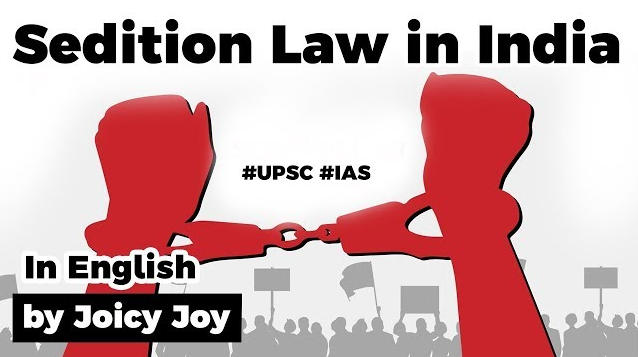Table of Contents
CURRENT AFFAIR
- The Section 124A (Sedition) of the Indian Penal Code (IPC) is being used more often recently.
What to study?
- For Prelims: What is Sedition? IPC 124?
- For Mains: Concerns over this law and it’s misuse, need for scrapping of this law.
Section 124A
- Section 124A IPC states that whoever brings or attempts to bring hatred or contempt, or excites or attempts to excite disaffection towards, the Government established by law in India shall be punished.
- The punishment may involve imprisonment of 3 years to life term, to which a fine may be added; or, with fine.
Historical Background
- Sedition laws were enacted in 17th century England when lawmakers believed that only good opinions of the government should survive, as bad opinions were detrimental to the government and monarchy.
- This sentiment (and law) was borrowed and inserted into the Section 124A of IPC in 1870, by the British.
- British used Sedition law to convict and sentence freedom fighters. It was first used to prosecute Bal Gangadhar Tilak in 1897.
- Mahatama Gandhi, too, was later tried for sedition for his articles in Young India.

VALIDITY
- Section 124A has been challenged in various courts in specific cases.
- The validity of the provision itself was upheld by a Constitution Bench of the Supreme Court (SC) in 1962, in Kedarnath Singh vs State of Bihar.
- That judgment went into the issue of whether the law on sedition is consistent with the fundamental right under Article 19 (1) (a).
- Article 19(1)(a) guarantees freedom of speech and expression.
- The SC laid down that every citizen has a right to say or write about the government by way of criticism or comment.
- It also added that this comment shouldn’t incite people to violence against the government established by law or with the intention of creating public disorder.
- The SC ruled that casual raising of slogans, once or twice by two individuals alone cannot be said to be aimed at exciting or attempt to excite hatred or disaffection by the government.
- In 1995, the Supreme Court, in Balwant Singh v State of Punjab, acquitted persons from charges of sedition for shouting slogans such as “Khalistan Zindabaad” and “Raj Karega Khalsa” outside a cinema after Indira Gandhi’s assassination.
- Instead of looking at the “tendency” of the words to cause public disorder, the Court held that mere sloganeering which evoked no public response did not amount to sedition, for which a more overt act was required; the accused did not intend to “incite people to create disorder” and no “law and order problem” actually occurred.
MAHARASHTRA CIRCULAR
- In a 2015 circular, the Maharashtra government laid down the preconditions to its police personnel before invoking sedition.
- The circular came during the hearing of a public interest litigation (PIL) in the Bombay High Court, after a cartoonist was booked for sedition.
- The sedition charge was subsequently dropped by the police; a PIL was filed in 2015 on the alleged arbitrary application of the charge.
High Court (HC) Ruling
- In 2015, the HC referred to the Kedarnath judgment and said there was a need to lay down parameters for the invocation of Section 124A.
- Otherwise a situation would result in which an unrestricted recourse to Section 124A resulting in a serious encroachment of guarantee of personal liberty conferred upon every citizen of a free society.
What are the state guidelines?
- The circular was issued, and its guidelines included preconditions to be kept in mind while invocation of 124A.
- The preconditions were that the words, signs or representations must,
- 1)Bring the government into hatred or contempt or
- 2)Cause or attempt to cause disaffection, enmity or disloyalty to the government.
- Along with these, it must also inciting violence or tend to create public disorder or a reasonable apprehension of public disorder.
- The comments expressing criticism of the government with a view to change the government by lawful means without any of the above are not seditious under Section 124A.
- To ensure that the section is used arbitrarily, the circular directed that a legal opinion from the district law officer should be taken by the public prosecutor addressing fulfillment of these conditions.
- Urgent and fresh debate on the need to repeal the sedition law, for it has no place in a vibrant democracy is the issue at the hour.
Latest Burning Issues | Free PDF























 WhatsApp
WhatsApp